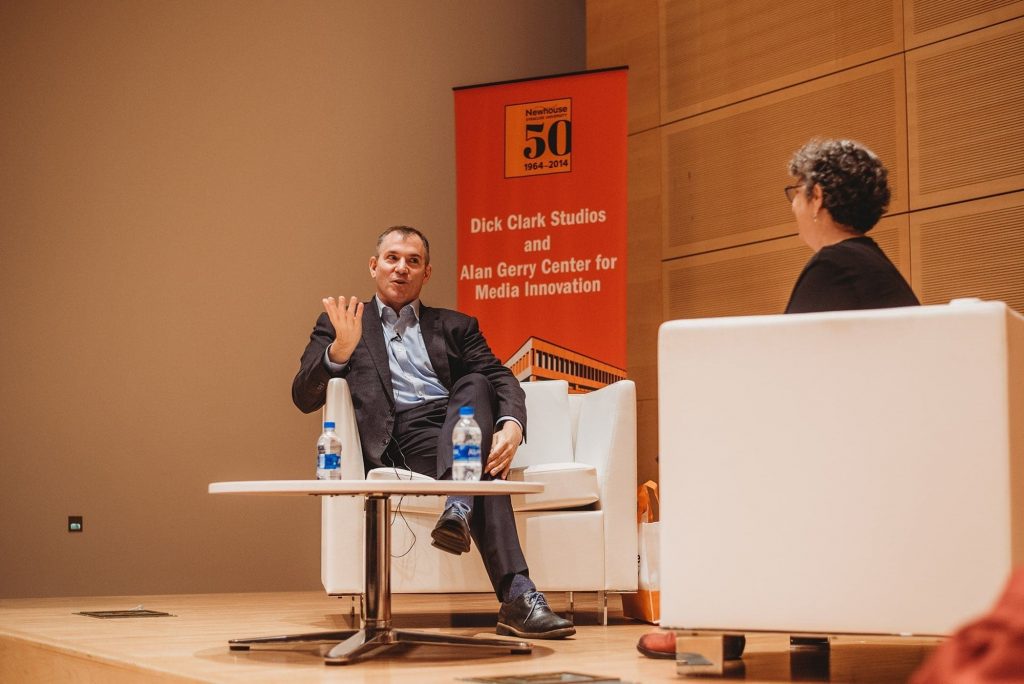NY Times opinion columnist discusses journalism, U.S. politics
NY Times opinion columnist discusses journalism career, U.S. politics

Frank Bruni visited the Newhouse school on Tuesday, Sept. 25 to talk about his experiences as a journalist and comment on the current state of U.S. politics, the Q&A style lecture was conducted by Magazine professor Harriet Brown in Hergenhan Auditorium.
Bruni has been an op-ed columnist for The New York Times since 1995 and has covered everything from food and entertainment to The White House, he is also notable for being the first openly gay op-ed columnist in the publication’s history. Bruni attended the University of North Carolina at Chapel Hill, where he got involved with the student newspaper, The Daily Tar Heel, as an entertainment writer.
Eventually, he fell in love with the craft and decided to pursue it after he graduated.
“I realized I loved it and realized it was a way people make a living,” Bruni said.
Bruni spoke of the start of his career and his time at the Detroit Free Press. It was there that he wrote a provocative story told through the eyes of a convicted child molester. Bruni said that he conducted about 27 hours of interviews with the man over the course of four months.
“It taught me a lot about not just how many stories there are out there to be told, but I learned a lot in that process about how many people really do want to tell their stories,” Bruni said.
Bruni also spoke about current political issues, including the allegations surrounding Supreme Court Nominee Brett Kavanaugh, which he wrote a piece about earlier in the day.
“He’s either this irredeemable drunken frat boy who’s suddenly figured out how to wear camouflage all these years, or he’s this wrongly tarnished angel,” Bruni said.
Bruni pointed out that people don’t always have to be one or the other; they can be multiple things at one time.
“The writings on him don’t do justice to how messy human beings are,” Bruni said.
Bruni also spoke about President Trump’s dominance of the news cycle.
“It’s not everything that’s going on in the country, it’s not everything that’s going on in the world,” Bruni said, “to err too much on the side of making it seem that way is, in a sense, to let him win.”
The conversation took a personal turn when Bruni moved on to discuss his rare eye condition that left him without sight vision in his right eye and how this diagnosis changed his perspective of the world and of those with disabilities.
“I feel like the gift of it is that I am so much more sensitive when I look around me,” Bruni said. “I’m more aware of what little room we sometimes give and the kind of deficiencies in our empathy.”
Bruni’s resilience shone through as he talked about his experience and what it taught him.
As the floor was opened to the audience for questions, an audience member asked about the implications of a possible second term for President Trump.
“I believe nothing is more important than making sure Donald Trump is a one-term president,” Bruni said. “I think he insults the office every day. I think he endangers us with the lack of stability, so I care about winning, that’s what I care about for 2020.”
When addressing the political divide in America, Bruni says that there’s still hope.
“As long as there are many, many people who are worried about this, I don’t think hope is lost and I think there’s a chance that someone will be able to charter a course back for us,” Bruni said.





